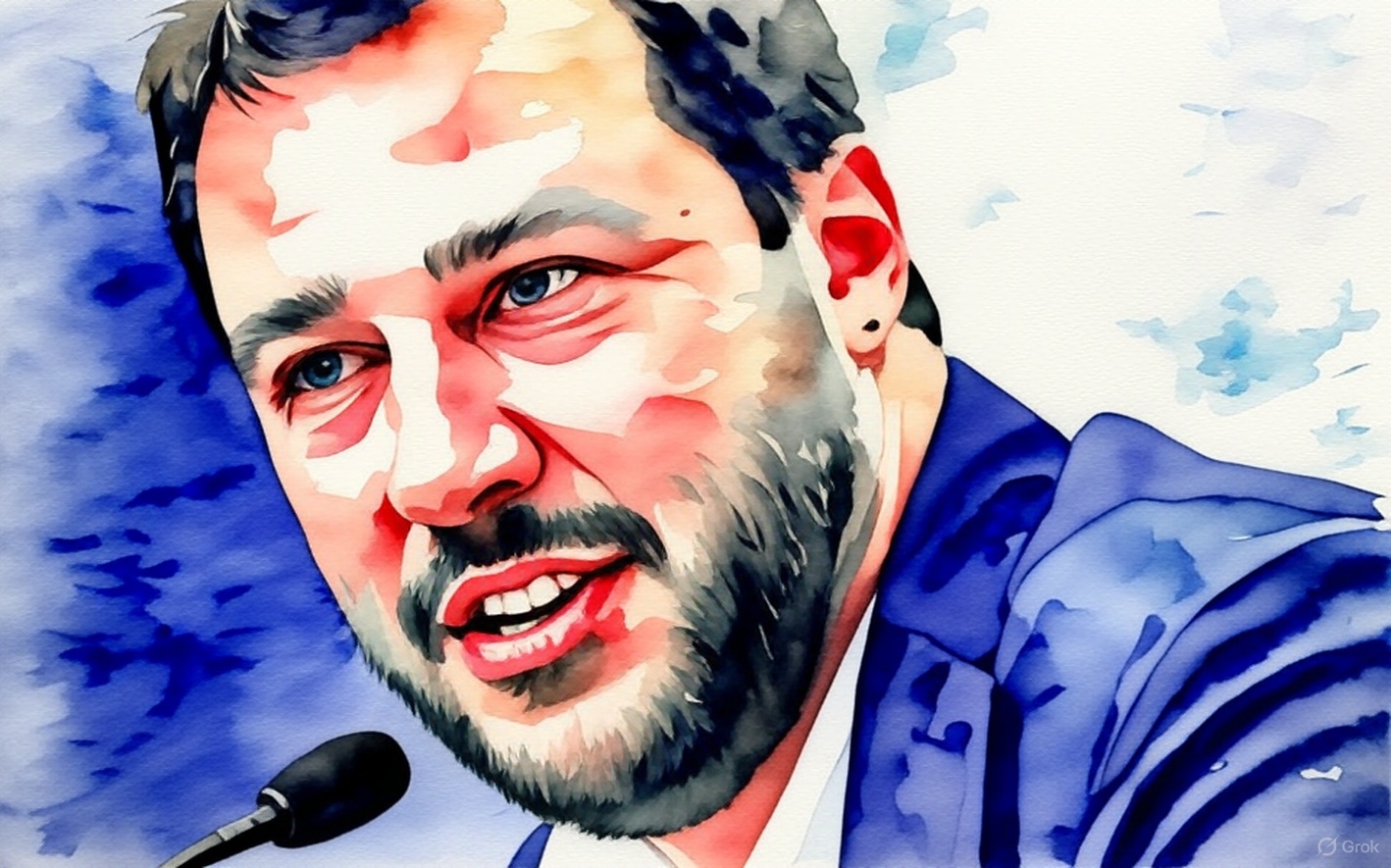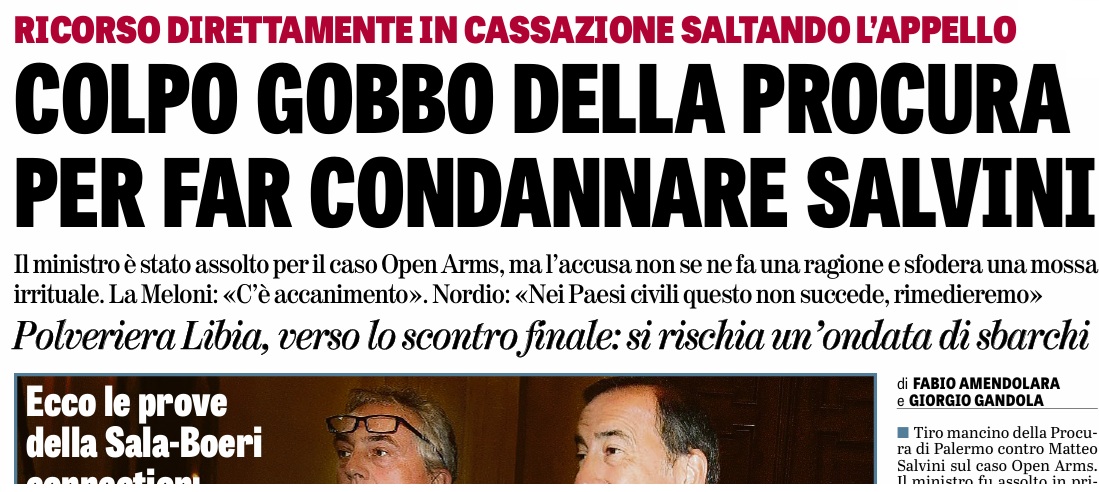Italy
Salvini Acquittal Appeal: A “Relentless Persecution” in the Courtroom Drama

The recent decision by the Palermo Public Prosecutor’s Office to appeal directly to Italy’s highest court, the Court of Cassation, following the acquittal of Matteo Salvini, the current Minister of Transport and former Minister of the Interior, has ignited a fierce debate. Many are viewing this unusual legal maneuver as a clear act of relentless persecution. This direct appeal, bypassing the standard process, has drawn sharp criticism from the Italian government and its allies, who perceive it as an ideologically driven attack rather than a purely judicial one.
This article delves into the specifics of the case, the perceived irregularity of the appeal, the reasons behind the “persecution” narrative, and the alleged benefits for left-wing Non-Governmental Organizations (NGOs).
The Open Arms Case: A Brief Overview
Matteo Salvini, in his capacity as Minister of the Interior in August 2019, faced accusations of kidnapping and refusal of official acts for preventing the disembarkation of 147 migrants from the Spanish NGO ship Open Arms. After a three-year trial, Salvini was fully acquitted on December 20, 2024, with the judge ruling “there were no grounds to proceed because the act itself did not exist.” This verdict, detailed in 268 pages of reasoning, was widely believed to have closed the case. However, this expectation was short-lived, as the Palermo Public Prosecutor’s Office decided to pursue further legal action.
The Irregularity of the “Appeal by Leap”
The most contentious aspect of the Public Prosecutor’s move is its direct appeal to the Court of Cassation, explicitly skipping the appeal stage. This procedure, known in legal slang as “ricorso per saltum” (appeal by leap), is described as an “unusual move” and is “used very few times in recent years” by prosecutors. Sources highlight its rarity, noting that only six such proceedings were recorded in the last five years, with only 33.3% of those cases resulting in an annulment with remand for a new judgment.
The Palermo Public Prosecutor’s Office, led by Maurizio De Lucia and including prosecutors Marzia Sabella and Giorgia Righi, argues that the first-degree acquittal is “manifestly vitiated for the non-observance… of that series of integrating norms (such as those on personal liberty and international conventions for rescue at sea).” They contend that the issue is not a factual dispute, as the facts are considered “ascertained,” but rather an “erroneous application of criminal law or other legal norms.”

To bolster their argument, the prosecutors reference a recent civil Cassation ruling in the Diciotti case. In that instance, the Supreme Court stated that delaying disembarkation was not a political act exempt from judicial review and violated personal liberty, appearing as “almost an assist in the penalty area from the civil judges to the Palermo prosecutors to immediately appeal to the Supreme Court.”
Significantly, the Court of Cassation has recently expressed critical views against the government’s immigration control policies. This makes the Public Prosecutor’s direct appeal to this specific court appear as a deliberate attempt by the prosecution to approach a “friendly” court that might judge ideologically, given that only ideology could lead to a victory against Salvini in this context.
However, Salvini’s defense counters that the accusatory thesis was “also rejected on the merits” by the first-degree court. They assert that the acquittal ruling explicitly found that Italy had no clear legal obligation to provide a “place of safety” (Pos) to the Open Arms, as the ship was flagged under Spain and the rescue occurred in Maltese waters. This suggests a fundamental disagreement not just on legal interpretation but also on the factual basis of Italy’s responsibility.
The Argument for Salvini’s “Persecution”
The narrative of “persecution” stems from the highly unusual nature of the appeal and the volatile political context surrounding Salvini’s actions. Several high-profile figures within the Italian government have publicly expressed strong disapproval:
- Premier Giorgia Meloni characterized the appeal as “surreal relentlessness” following a “failed three-year trial” that concluded with a full acquittal. She questioned the expenditure of “all this energy and resources” while “thousands of honest citizens await justice.”
- Justice Minister Carlo Nordio was even more direct, stating that “in civilized countries, magistrates do not appeal acquittal sentences.” He promised that the government would “remedy” this situation. Nordio further argued that it is technically impossible to achieve a conviction “beyond any reasonable doubt” when a previous judge, after years of hearings, had already acquitted due to doubt. He linked this practice to the “slowness of our justice” and the “inability of many magistrates to oppose the obvious.”
- Salvini’s own reaction reveals his deep frustration. He acknowledged feeling “anger and irritation” but asserted he would “push straight ahead.” He maintained that “defending Italy and its borders is not a crime.” Salvini also claimed that “politicized and left-wing magistrates are now a small, albeit noisy, minority.”
Sources repeatedly suggest that the Public Prosecutor’s action is “frontal, political, even ideological.” It is portrayed as a “rearguard battle” waged by a “left-wing judiciary (spearhead of the opposition)” that possesses a “consolidated ideology.” The appeal is explicitly called an “attempt to rewrite a judicial defeat.” This narrative suggests a deliberate effort to keep Salvini entangled in legal proceedings indefinitely, turning his innocence into “a condition of infinite trial,” effectively aiming to “make the Lega leader grow old in court.” This situation, according to some, highlights a deep-seated clash between political power and the judiciary, with the appeal’s consequences being “objectively more political than legal.”
The Role and Benefit of NGOs
The sources also shed light on how left-wing NGOs, particularly Open Arms, appear to benefit from the prolonged legal battle against Salvini.
- Open Arms’ enthusiastic reception of the appeal is explicitly stated: the NGO “greets the appeal to Cassation against Salvini.” They express “full confidence in the prosecutor’s work” and affirm their “no intention of withdrawing” from being a civil party in the proceedings.
- Oscar Camps, the founder of Open Arms, “exults” at the news. Salvini interprets this as Camps waging a “political battle against me on the skin of people.” He points to a video showing Camps celebrating having “made me fall,” implying that the NGO prioritized political objectives over humanitarian concerns.
Broader Implications and Outlook
This ongoing legal saga extends beyond Salvini and the Open Arms case, touching upon fundamental questions regarding the balance of power between the executive and judicial branches in Italy. The government’s perspective, supported by the sources, is that this highlights a struggle for the “last word” in policy-making, which should belong to the law, not to the “sensibilities of the prosecutor on duty.”
The broader push for justice reform, particularly the separation of judicial careers, is presented as a crucial response to what is seen as judicial overreach. The current situation, characterized by political allies as an attack on the legitimate policy of defending national borders against illegal immigration, is perceived to be broadly supported by a large majority of the Italian populace. This persistent legal challenge creates a climate of instability and fuels the perception that the Italian justice system is susceptible to “incompetence or political partisanship.” The ultimate resolution of this case will undoubtedly have significant implications for the future of justice and political discourse in Italy.






